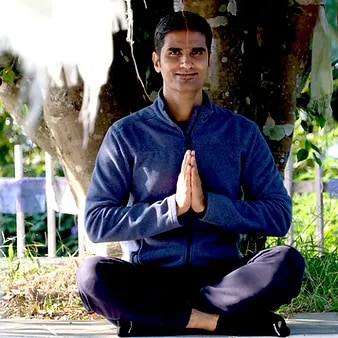Yoga as a Tool for Emotional Intelligence and Self-Awareness
by Hardik Mehta

Emotions often take a backseat to productivity, deadlines, and responsibilities in our fast-paced world. Yet emotional intelligence (EI)—the ability to understand, manage, and express emotions effectively—plays a crucial role in shaping how we relate to ourselves and others. Self-awareness, an essential component of EI, allows us to recognise our emotional triggers, reactions, and behavioural patterns. When it comes to cultivating these qualities, yoga proves to be a profound and practical tool.
Understanding Emotional Intelligence and Self-Awareness
Emotional intelligence involves five core elements: self-awareness, self-regulation, motivation, empathy, and social skills. It allows individuals to navigate social complexities, handle interpersonal relationships judiciously, and make personal decisions that achieve positive results. Among these, self-awareness serves as the foundation. It empowers us to observe our thoughts and feelings without judgment, creating space for thoughtful response instead of reactive behaviour.
But how do we enhance these inner capacities? The ancient practice of yoga offers a holistic solution.
How Yoga Nurtures Emotional Intelligence
Yoga is not merely a form of exercise — it’s a mind-body-spirit practice that combines physical postures (asanas), breath control (pranayama), meditation (dhyana), and ethical principles (yamas and niyamas). This integrative approach creates a direct impact on our emotional landscape in the following ways:
- Developing Mindfulness through Breath
Breath is the anchor of the present moment. Yogic breathing techniques such as Nadi Shodhana (alternate nostril breathing) and Ujjayi pranayama help calm the nervous system and create a state of inner balance. When practiced consistently, these techniques enhance self-awareness by teaching us to tune in to our body’s subtle responses.
- Observing Emotions without Reacting
Meditation and yogic mindfulness practices encourage non-reactivity. Instead of suppressing emotions or letting them dictate behaviour, yoga allows us to sit with them, observe them, and eventually let them pass. Being able to manage emotions effectively plays a vital role in nurturing meaningful relationships and fostering clear, respectful communication.
- Physical Postures That Release Emotional Tension
The body stores emotions — especially stress, grief, and trauma. Certain yoga poses like Child’s Pose (Balasana), Pigeon Pose (Kapotasana), and Seated Forward Fold (Paschimottanasana) are known to release blocked energy in the hips and spine, areas often associated with emotional storage. By physically releasing tension, we make space for emotional clarity.
- Increased Empathy and Compassion
Yoga cultivates a deeper connection with the self, which organically extends outward. As we learn to be kind and patient with our own limitations, we become more compassionate toward others. This shift enhances the empathy aspect of emotional intelligence.
- Enhancing Introspection through Meditation
Daily meditation helps us become aware of our internal narratives — the stories we tell ourselves about who we are and how the world works. By noticing these thought patterns, we can challenge limiting beliefs, reduce self-criticism, and cultivate a more empowered self-image.
The Neuroscience Behind Yoga and Emotional Intelligence
Studies in neuroscience support what yogis have known for centuries: mindful movement and breath work change the brain. Regular yoga practice has been shown to increase grey matter in the prefrontal cortex, the part of the brain responsible for self-awareness, decision-making, and emotional regulation.
Moreover, yoga reduces activity in the amygdala, the brain’s fear centre. This helps individuals respond to stress more calmly and avoid emotional outbursts — a critical skill for anyone looking to boost their emotional intelligence.
Cultivating Self-Awareness through Yogic Principles
The Yamas and Niyamas, the ethical foundations of yoga as described in Patanjali’s Yoga Sutras, offer timeless wisdom for emotional mastery. For example:
- Satya (truthfulness) encourages honesty with oneself, fostering deeper self-awareness.
- Svadhyaya (self-study) invites us to reflect on our thoughts, habits, and behaviours.
- Santosha, or the practice of contentment, fosters a deep sense of inner calm and helps minimize impulsive emotional responses.
- Ahimsa (non-violence) extends beyond physical action to include our internal dialogue, helping reduce self-criticism.
When these principles are applied consistently, they create a fertile ground for emotional growth and awareness.
Sayujya Yoga: Guiding the Journey Within
At Sayujya Yoga, the journey toward emotional intelligence and self-awareness is nurtured through thoughtfully curated classes, 200-Hour TTC programs, and short-term workshops that blend traditional philosophy with contemporary relevance. The teachings are deeply rooted in yogic wisdom, offering students not just physical flexibility but also emotional resilience and spiritual clarity.
With experienced instructors and a heart-centred approach, Sayujya Yoga supports individuals in uncovering their authentic selves and leading lives infused with purpose, balance, and connection. Whether you’re a beginner or an experienced practitioner, Sayujya’s offerings provide the space and support to dive deep into your emotional world with compassion and courage.
Tips to Begin Your Yoga Journey for Emotional Intelligence
- Start small: Even 10 minutes a day of mindful yoga or breathwork can create a shift.
- Journal after practice: Note how you feel physically, mentally, and emotionally after each session.
- Seek a mentor or supportive circle: Becoming part of a mindful space like Sayujya Yoga can offer the encouragement and wisdom you need to stay on track.
Remember, developing emotional intelligence is a gradual process that blossoms with regular practice and honest self-inquiry.
Emotional intelligence and self-awareness are not fixed traits; they are skills that can be cultivated, and yoga offers a powerful, holistic path to do just that. By integrating breath, movement, stillness, and self-inquiry, yoga empowers us to understand and manage our emotions, live more mindfully, and relate more compassionately with others.
If you’re looking for a nurturing and supportive space to deepen your emotional journey through yoga, Sayujya Yoga offers the perfect haven for transformation and inner balance.
About the Author

Hardik Mehta
Hardik is an E-RYT 500 & YACEP (Yoga Alliance Continuing Education Provider), Yoga Alliance, USA. He has been practicing yoga for the last 9 years. Prior to finding his true calling in Yoga, he was working with various corporates for 12 years in the Retail and eCommerce sector.
